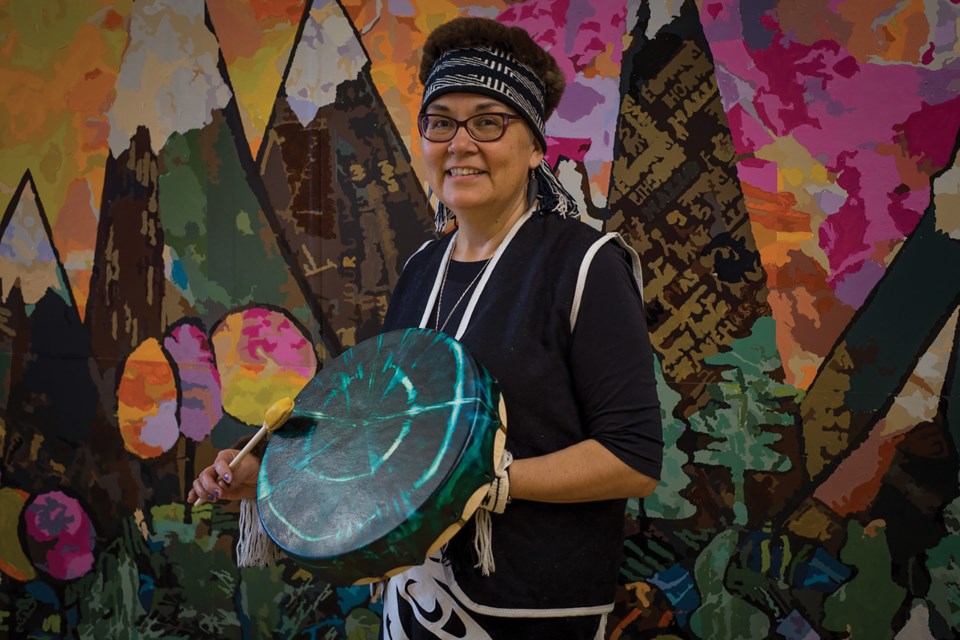The Gibsons Public Library will be the setting for an authoritative presentation of Sḵwx̱wú7mesh cultural narratives as part of an upcoming storytelling tour by author and educator Ḵung Jaadee.
Ḵung Jaadee, whose heritage includes X̱aayda (Haida), xʷməθkʷəy̓əm (Musqueam) and Sḵwx̱wú7mesh (Squamish) First Nations, will recount Sḵwx̱wú7mesh legends popularized by Mohawk author and performer E. Pauline Johnson during an all-ages event at the library on Saturday, Aug. 6.
Ḵung Jaadee is herself the author of two books for young readers, Raven’s Feast and Gifts from Raven, as well a 2019 textbook for elementary students titled Haida Nation: Indigenous Communities in Canada. Last year she served as the Vancouver Public Library’s Indigenous Storyteller in Residence.
“When I perform, I like to use my language [Xaat Kíl, or Haida],” said Ḵung Jaadee, who has been telling stories professionally for almost three decades. “I sometimes use one word, but most of the time I might use a whole sentence and I’ll get the audience to repeat it. And as the story progresses, sometimes in the beginning I’ll translate. But as the story progresses, I don’t need to translate because they know what it is.”
Although Ḵung Jaadee’s primary language is Xaat Kíl, she also incorporates elements of the Sḵwx̱wú7mesh sníchim, or Squamish language. “What I know, I use in the stories as well,” she said. Ḵung Jaadee was born and raised in Haida Gwaii and now lives in Vancouver.
Her traditional name, which means “Moon Woman,” was given to her by a cousin in 2008 during a memorial potlatch for her great-uncle, who was a clan hereditary chief. She prefers to use it instead of her so-called legal name, Roberta Kennedy, as a way of restoring what was taken from Indigenous people through assimilation-driven colonial policies.
“During the last smallpox epidemic, missionaries came and converted the survivors to Christianity with fear,” she said. “We weren’t allowed to have a traditional name. That’s why I use my traditional name every day.
“We weren’t allowed to live in communal-style homes. All of a sudden we’re isolated and we’re raising our children on our own. And all of a sudden our food gathering practices were restricted.”
Alongside Ḵung Jaadee’s focus on language preservation, she recognizes that lexicons need to evolve through invention and recombination.
As her ailing grandfather neared death, he continued to teach the Xaat Kíl language while bedridden. To sooth his parched mouth, visitors offered him flavoured ice snacks.
“Then he gave us a word that we could use for [freezies],” said Ḵung Jaadee. “And he was the one who named the T.V., with a word that basically means ‘laughing box.’”
Since many Indigenous stories are proprietary, Ḵung Jaadee obtained permission from an uncle to recount Sḵwx̱wú7mesh tales. Several years ago in Toronto, during a storytelling festival, she had a heated exchange with a non-Indigenous participant who vowed to preserve Haida culture by spreading Ḵung Jaadee’s stories.
“But I [said] no, you need to be adopted into my clan first, and then you need to come and actually live in my community, and even then there are going to be restrictions because you’re not Haida. Even then there are some stories that I won’t be able to tell, about sacred ceremonies and masks.”
During her Gibsons appearance, Ḵung Jaadee will tailor her stories to the local audience by revealing how the original village near the townsite, Ch’ḵw’elhp, got its name. She also plans to share Sḵwx̱wú7mesh Raven stories. “I had to alter my Squamish Raven story a bit,” she said, “because the first time I performed it, Raven was really cheeky and was poking his brother Seagull’s foot with a knife. The kids were squirming, so I had to change it.”
Ḵung Jaadee’s storytelling tour will continue with an appearance at Bowen Island’s Write On Bowen festival gala in the evening of Aug. 6. For her Gibsons performance earlier that day at 10:30 a.m., registration is required by contacting the library at 604-886-2130.




